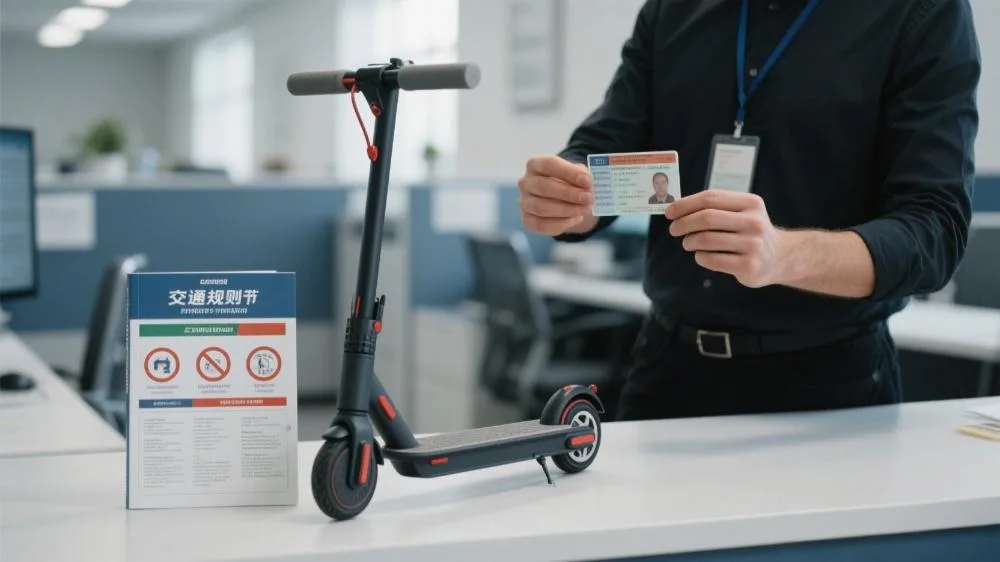how to get an e-scooter license

When Berlin university student Sarah prepared to purchase her first electric scooter, she was surprised to discover local regulations required passing a specialized license test for legal road use. How to get an e-scooter license? According to the European Transport Authority’s 2025 report, 67% of major Western cities have implemented e-scooter licensing systems, with 35% updating their testing standards between 2024-2025. Research from professional content platform novascooter reveals the average licensing process takes 3-6 weeks, comprising three core components: theoretical study (40%), practical training (35%), and regulatory exams (25%).
The International Road Safety Association’s 2025 white paper identifies three primary license types: standalone permits (42% market share), motorcycle license extensions (33%), and temporary permits (25%). Notably, the London Transport Institute’s study of 5,000 users found that those who systematically studied traffic rules had 58% fewer accidents than self-taught riders, while formal training participants achieved an 89% pass rate compared to 63% for self-preparation. Cambridge University’s 2025 consumer behavior research uncovered a critical insight: 83% of users underestimated local licensing requirements, yet 92% of licensed riders agreed testing genuinely improved road safety awareness.

Western License Types Explained
1. Standalone E-Scooter Licenses
Applicability:
- Coverage parameters:
- Power limits: Typically for 500W-1000W models
- Speed ceilings: 25-45km/h range
- Age requirements: 16 years and above
- Examination structure:Test ModuleWeightingPassing StandardTheory40%80%+ scoreClosed-course35%No critical errorsRoad test25%Safety evaluation pass
Application Process:
- Documentation phase (3-5 business days)
- Identity verification
- Proof of residence
- Basic medical report
- Training phase (2-4 weeks)
- Online theory (12 mandatory hours)
- Practical training (minimum 6 hours)
- Mock road tests (3+ sessions)
2. Motorcycle License Extensions
Conversion Requirements:
- Eligibility:
- Valid motorcycle license for 1+ years
- No serious traffic violations
- 4-hour specialized training
- Comparative advantages:
- Time savings: 60%+ reduction
- Cost savings: 45-55% less
- Expanded permissions: Higher-power models
Regional Variations:
- Geographic differences:
- Nordic countries: Automatic inclusion
- Southern Europe: Additional theory test
- UK: England/Scotland variations
- Conversion steps:
- Submission (online/in-person)
- Safety seminar (2 hours)
- Administrative fees (€25-€50)
Step-by-Step Licensing Guide
1. Preparation Phase
1.1 Eligibility Verification
Key Checks:
- Age validation:
- Minimum age (16/18 years)
- Guardian consent (minors)
- Residency duration (some cities)
- Health standards:
- Vision test (0.8+ acuity)
- Reaction assessment
- No medical contraindications
1.2 Study Materials
Official Resources:
- Theory materials:
- Transport ministry syllabus (2025 edition)
- Local regulation supplements
- Multilingual options
- Learning aids:
- Approved practice apps
- 3D interactive systems
- Local rider communities
2. Examination Process
2.1 Theory Test Components
Core Knowledge Areas:
- Traffic rules (45%):
- Right-of-way determination
- Special zone restrictions
- Night riding protocols
- Vehicle knowledge (30%):
- Basic maintenance
- Fault recognition
- Safety gear standards
- Emergency response (25%):
- Incident management
- Accident procedures
- First aid basics
Test Strategies:
- Error pattern analysis
- Memory palace technique
- Practice test frequency
2.2 Practical Assessment
Closed-Course Elements:
- Basic control:
- Figure-8 weaving (2.5m spacing)
- Emergency braking (20km/h→stop)
- Hill starts (15° incline)
- Advanced maneuvers:Skill TestGrading CriteriaCommon MistakesNarrow passageBoundary clearanceSpeed controlObstacle avoidance2-second reactionOversteeringLoad balanceItem securityWeight shift
Road Evaluation:
- Observation focus:
- Blind spot checks
- Signal compliance
- Following distance
- Automatic failures:
- Pedestrian right-of-way violation
- Improper overtaking (-30 points)
- Incorrect hand signals (-20 points)
Cost & Time Optimization
1. Fee Structure Analysis
Typical Expenses:
- Fixed costs:
- Application fee: €50-€120
- Materials: €15-€30
- Processing: €20-€40
- Variable costs:
- Instruction (€25-€50/hour)
- Retake fees (first attempt free)
- Credential production
Savings Strategies:
- Package options:
- All-inclusive courses (15-20% savings)
- Group discounts
- Student programs
- Self-preparation:
- Used materials
- Free resources
- Study groups
2. Time Management
Efficient Scheduling:
- Parallel processing:
- Theory/practical overlap
- Medical appointment timing
- Optimal test scheduling
- Accelerated options:Service TypeTime SavedPremium CostIntensive40%+€100VIP booking60%+€150Weekend30%+€50
Common Delays:
- Documentation issues
- Testing backlogs
- Retake waiting periods
Special Circumstances
1. International License Conversion
Recognition Agreements:
- EU internal:
- Automatic recognition
- Registration requirements
- Transition periods
- Transatlantic:RegionKey DifferencesUSAState variationsCanadaProvincial rulesUKTest exemptions
Conversion Steps:
- Document notarization
- Certified translation
- Local registration
2. Violations & Retakes
Examination Failures:
- Retake rules:
- Theory: 3-day wait
- Practical: 7-day interval
- Attempt limits: 3/half-year
- Improvement tactics:
- Examiner feedback review
- Targeted practice
- Official evaluation analysis
Penalty Systems:
- Point schemes:
- 12-point standard
- Deduction scales
- Educational reductions
- Serious offenses:ViolationConsequencesUnlicensed€500-€2000 fineDUIRevocation + recordRepeatMandatory retraining
